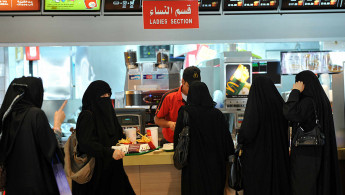Saudi women no longer need to sit behind partitions Riyadh ends gender segregation
The decision, which essentially ends gender segregation enforcement in public, was quietly announced on Sunday in a lengthy and technically worded statement by the Municipal and Rural Affairs Ministry.
While the requirement has been removed, it is unclear whether most restaurants or cafes will go ahead with the change.
While some restaurants and cafes in the coastal city of Jeddah and upscale hotels in the capital Riyadh had already been allowing unrelated men and women to sit freely, the move marks a major, sensitive change for traditional Saudis who view gender segregation as a religious requirement.
Notably, neighbouring Muslim countries do not enforce gender segregation but, across Saudi Arabia, the norm has been that unrelated men and women are not permitted to mix in public.
Government-run schools and most public universities remain segregated, as are most Saudi weddings.
Restaurants and cafes in Saudi Arabia, including major Western chains like Starbucks, are currently segregated by "family" sections allocated for women who are out on their own or who are accompanied by male relatives, and "singles" sections for just men.
Many also have separate entrances for women and partitions or rooms for families where women are not visible to single men. In smaller restaurants or cafes with no space for segregation, women are not allowed in.
In recent years, Saudi Arabia has begun to introduce social reforms, with women and men now able to attend concerts and movie theaters that were once banned.
Two years ago, women for the first time were allowed to attend sports events in stadiums in the so-called "family" sections. Young girls in recent years have also been allowed access to physical education and sports in school, a right that only boys had been afforded.
Read more: The catch with Riyadh relaxing male guardianship laws
Last year women were finally granted the right to drive, and new reforms introduced this year have allowed women over the age of 21 to travel abroad, in theory, without a male guardian.
But such reforms have been criticised by rights organisations and critics of the ultraconservative kingdom, who say that they are geared to produce a smokescreen of a reform-driven modern Saudi Arabia to mask reports of continuing human rights abuses, including the imprisonment of 11 women's rights activists just weeks ahead of the decision to lift the ban on women drivers.
Critics also say the reforms are designed to facilitate foreign investment and tourism in the country as Crown Prince Mohammad bin Salman attempts to steer the kingdom out of oil dependency.
The decision to end enforcement of segregation in restaurants was also announced in a statement published by the state-run Saudi Press Agency. The statement listed a number of newly approved technical requirements for buildings, schools, stores and sports centers.
The statement noted that the long list of published decisions was aimed at attracting investments and creating greater business opportunities.
Among the regulations announced was "removing a requirement by restaurants to have an entrance for single men and [another] for families".
Couched between a new regulation about the length of a building's facade and allowing kitchens on upper floors to operate was another critical announcement stating that restaurants no longer need to "specify private spaces" - or in other words, partitions would no longer be required.
The new rules remove restrictions that had been in place, but do not state that restaurants or cafes have to end segregated entrances or seated areas. Many families in conservative swaths of the country, where women cover their hair and face in public, may prefer eating only at restaurants with segregated spaces.
Follow us on Twitter and Instagram to stay connected





![The UAE is widely suspected of arming the RSF militia [Getty]](/sites/default/files/styles/image_330x185/public/2024-11/GettyImages-472529908.jpg?h=69f2b9d0&itok=Yauw3YTG)
![Netanyahu furiously denounced the ICC [Getty]](/sites/default/files/styles/image_330x185/public/2024-11/GettyImages-2169352575.jpg?h=199d8c1f&itok=-vRiruf5)
![Both Hamas and the Palestinian Authority welcomed the ICC arrest warrants [Getty]](/sites/default/files/styles/image_330x185/public/2024-11/GettyImages-2178351173.jpg?h=199d8c1f&itok=TV858iVg)